International Business Literature Review
VerifiedAdded on 2020/02/14
|11
|3893
|41
AI Summary
This assignment requires a thorough review of academic literature related to International Business published between 2011 and 2014. Students are expected to analyze key theories, concepts, and trends within the field, drawing upon cited sources such as journal articles, patents, and online resources. The review should demonstrate a deep understanding of international business principles and their evolution over time.
Contribute Materials
Your contribution can guide someone’s learning journey. Share your
documents today.
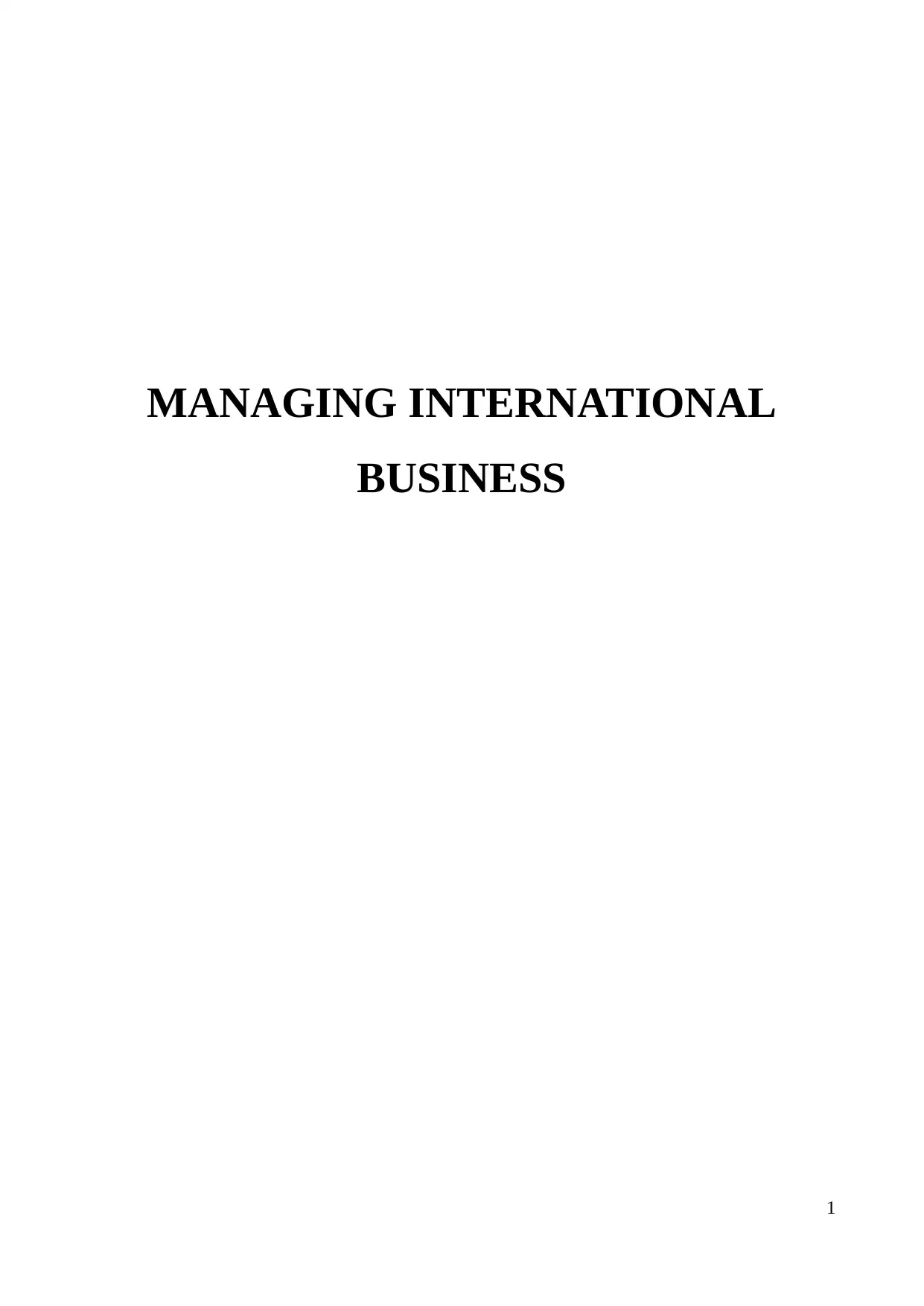
MANAGING INTERNATIONAL
BUSINESS
1
BUSINESS
1
Secure Best Marks with AI Grader
Need help grading? Try our AI Grader for instant feedback on your assignments.
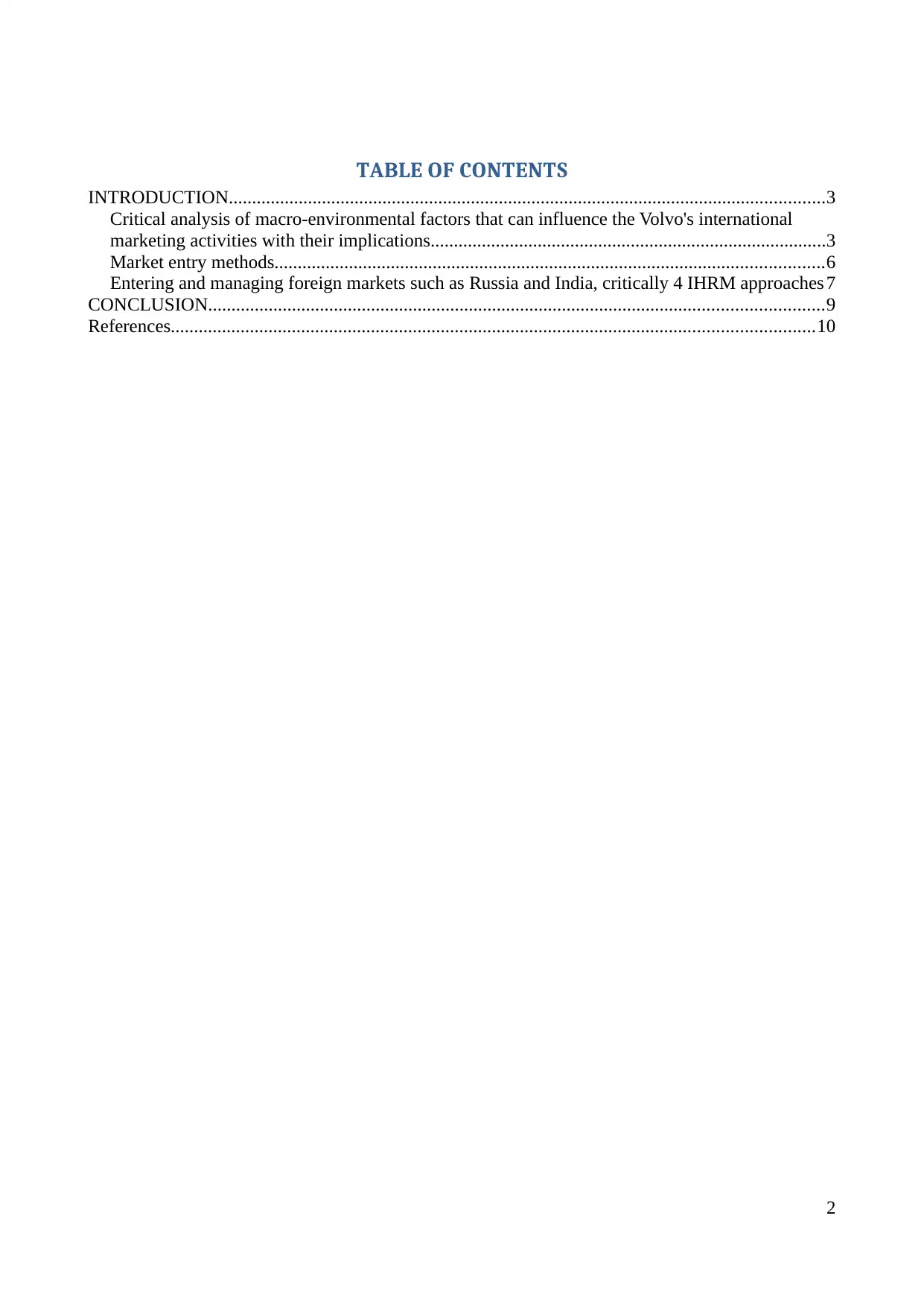
TABLE OF CONTENTS
INTRODUCTION................................................................................................................................3
Critical analysis of macro-environmental factors that can influence the Volvo's international
marketing activities with their implications.....................................................................................3
Market entry methods......................................................................................................................6
Entering and managing foreign markets such as Russia and India, critically 4 IHRM approaches 7
CONCLUSION....................................................................................................................................9
References..........................................................................................................................................10
2
INTRODUCTION................................................................................................................................3
Critical analysis of macro-environmental factors that can influence the Volvo's international
marketing activities with their implications.....................................................................................3
Market entry methods......................................................................................................................6
Entering and managing foreign markets such as Russia and India, critically 4 IHRM approaches 7
CONCLUSION....................................................................................................................................9
References..........................................................................................................................................10
2
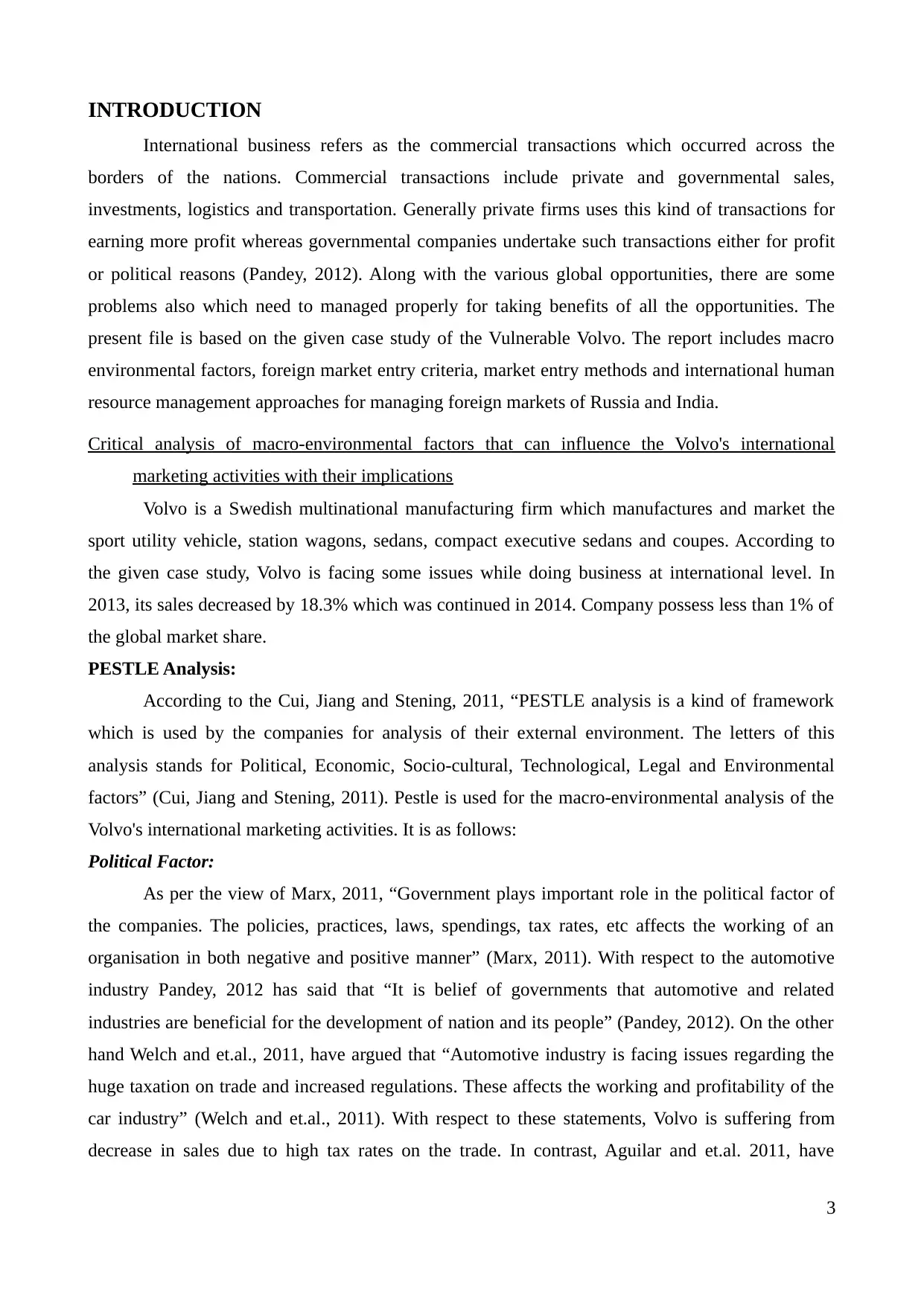
INTRODUCTION
International business refers as the commercial transactions which occurred across the
borders of the nations. Commercial transactions include private and governmental sales,
investments, logistics and transportation. Generally private firms uses this kind of transactions for
earning more profit whereas governmental companies undertake such transactions either for profit
or political reasons (Pandey, 2012). Along with the various global opportunities, there are some
problems also which need to managed properly for taking benefits of all the opportunities. The
present file is based on the given case study of the Vulnerable Volvo. The report includes macro
environmental factors, foreign market entry criteria, market entry methods and international human
resource management approaches for managing foreign markets of Russia and India.
Critical analysis of macro-environmental factors that can influence the Volvo's international
marketing activities with their implications
Volvo is a Swedish multinational manufacturing firm which manufactures and market the
sport utility vehicle, station wagons, sedans, compact executive sedans and coupes. According to
the given case study, Volvo is facing some issues while doing business at international level. In
2013, its sales decreased by 18.3% which was continued in 2014. Company possess less than 1% of
the global market share.
PESTLE Analysis:
According to the Cui, Jiang and Stening, 2011, “PESTLE analysis is a kind of framework
which is used by the companies for analysis of their external environment. The letters of this
analysis stands for Political, Economic, Socio-cultural, Technological, Legal and Environmental
factors” (Cui, Jiang and Stening, 2011). Pestle is used for the macro-environmental analysis of the
Volvo's international marketing activities. It is as follows:
Political Factor:
As per the view of Marx, 2011, “Government plays important role in the political factor of
the companies. The policies, practices, laws, spendings, tax rates, etc affects the working of an
organisation in both negative and positive manner” (Marx, 2011). With respect to the automotive
industry Pandey, 2012 has said that “It is belief of governments that automotive and related
industries are beneficial for the development of nation and its people” (Pandey, 2012). On the other
hand Welch and et.al., 2011, have argued that “Automotive industry is facing issues regarding the
huge taxation on trade and increased regulations. These affects the working and profitability of the
car industry” (Welch and et.al., 2011). With respect to these statements, Volvo is suffering from
decrease in sales due to high tax rates on the trade. In contrast, Aguilar and et.al. 2011, have
3
International business refers as the commercial transactions which occurred across the
borders of the nations. Commercial transactions include private and governmental sales,
investments, logistics and transportation. Generally private firms uses this kind of transactions for
earning more profit whereas governmental companies undertake such transactions either for profit
or political reasons (Pandey, 2012). Along with the various global opportunities, there are some
problems also which need to managed properly for taking benefits of all the opportunities. The
present file is based on the given case study of the Vulnerable Volvo. The report includes macro
environmental factors, foreign market entry criteria, market entry methods and international human
resource management approaches for managing foreign markets of Russia and India.
Critical analysis of macro-environmental factors that can influence the Volvo's international
marketing activities with their implications
Volvo is a Swedish multinational manufacturing firm which manufactures and market the
sport utility vehicle, station wagons, sedans, compact executive sedans and coupes. According to
the given case study, Volvo is facing some issues while doing business at international level. In
2013, its sales decreased by 18.3% which was continued in 2014. Company possess less than 1% of
the global market share.
PESTLE Analysis:
According to the Cui, Jiang and Stening, 2011, “PESTLE analysis is a kind of framework
which is used by the companies for analysis of their external environment. The letters of this
analysis stands for Political, Economic, Socio-cultural, Technological, Legal and Environmental
factors” (Cui, Jiang and Stening, 2011). Pestle is used for the macro-environmental analysis of the
Volvo's international marketing activities. It is as follows:
Political Factor:
As per the view of Marx, 2011, “Government plays important role in the political factor of
the companies. The policies, practices, laws, spendings, tax rates, etc affects the working of an
organisation in both negative and positive manner” (Marx, 2011). With respect to the automotive
industry Pandey, 2012 has said that “It is belief of governments that automotive and related
industries are beneficial for the development of nation and its people” (Pandey, 2012). On the other
hand Welch and et.al., 2011, have argued that “Automotive industry is facing issues regarding the
huge taxation on trade and increased regulations. These affects the working and profitability of the
car industry” (Welch and et.al., 2011). With respect to these statements, Volvo is suffering from
decrease in sales due to high tax rates on the trade. In contrast, Aguilar and et.al. 2011, have
3
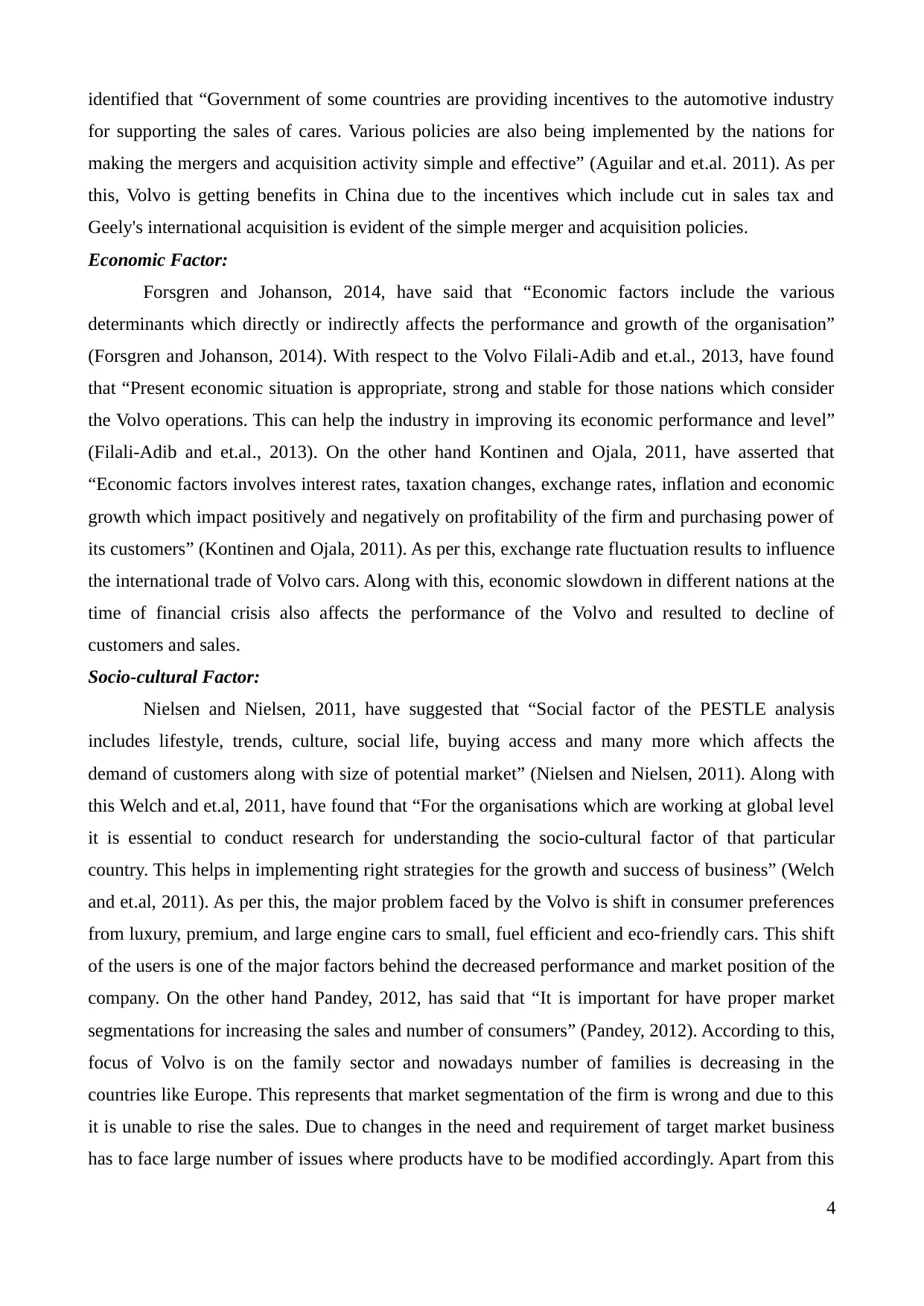
identified that “Government of some countries are providing incentives to the automotive industry
for supporting the sales of cares. Various policies are also being implemented by the nations for
making the mergers and acquisition activity simple and effective” (Aguilar and et.al. 2011). As per
this, Volvo is getting benefits in China due to the incentives which include cut in sales tax and
Geely's international acquisition is evident of the simple merger and acquisition policies.
Economic Factor:
Forsgren and Johanson, 2014, have said that “Economic factors include the various
determinants which directly or indirectly affects the performance and growth of the organisation”
(Forsgren and Johanson, 2014). With respect to the Volvo Filali-Adib and et.al., 2013, have found
that “Present economic situation is appropriate, strong and stable for those nations which consider
the Volvo operations. This can help the industry in improving its economic performance and level”
(Filali-Adib and et.al., 2013). On the other hand Kontinen and Ojala, 2011, have asserted that
“Economic factors involves interest rates, taxation changes, exchange rates, inflation and economic
growth which impact positively and negatively on profitability of the firm and purchasing power of
its customers” (Kontinen and Ojala, 2011). As per this, exchange rate fluctuation results to influence
the international trade of Volvo cars. Along with this, economic slowdown in different nations at the
time of financial crisis also affects the performance of the Volvo and resulted to decline of
customers and sales.
Socio-cultural Factor:
Nielsen and Nielsen, 2011, have suggested that “Social factor of the PESTLE analysis
includes lifestyle, trends, culture, social life, buying access and many more which affects the
demand of customers along with size of potential market” (Nielsen and Nielsen, 2011). Along with
this Welch and et.al, 2011, have found that “For the organisations which are working at global level
it is essential to conduct research for understanding the socio-cultural factor of that particular
country. This helps in implementing right strategies for the growth and success of business” (Welch
and et.al, 2011). As per this, the major problem faced by the Volvo is shift in consumer preferences
from luxury, premium, and large engine cars to small, fuel efficient and eco-friendly cars. This shift
of the users is one of the major factors behind the decreased performance and market position of the
company. On the other hand Pandey, 2012, has said that “It is important for have proper market
segmentations for increasing the sales and number of consumers” (Pandey, 2012). According to this,
focus of Volvo is on the family sector and nowadays number of families is decreasing in the
countries like Europe. This represents that market segmentation of the firm is wrong and due to this
it is unable to rise the sales. Due to changes in the need and requirement of target market business
has to face large number of issues where products have to be modified accordingly. Apart from this
4
for supporting the sales of cares. Various policies are also being implemented by the nations for
making the mergers and acquisition activity simple and effective” (Aguilar and et.al. 2011). As per
this, Volvo is getting benefits in China due to the incentives which include cut in sales tax and
Geely's international acquisition is evident of the simple merger and acquisition policies.
Economic Factor:
Forsgren and Johanson, 2014, have said that “Economic factors include the various
determinants which directly or indirectly affects the performance and growth of the organisation”
(Forsgren and Johanson, 2014). With respect to the Volvo Filali-Adib and et.al., 2013, have found
that “Present economic situation is appropriate, strong and stable for those nations which consider
the Volvo operations. This can help the industry in improving its economic performance and level”
(Filali-Adib and et.al., 2013). On the other hand Kontinen and Ojala, 2011, have asserted that
“Economic factors involves interest rates, taxation changes, exchange rates, inflation and economic
growth which impact positively and negatively on profitability of the firm and purchasing power of
its customers” (Kontinen and Ojala, 2011). As per this, exchange rate fluctuation results to influence
the international trade of Volvo cars. Along with this, economic slowdown in different nations at the
time of financial crisis also affects the performance of the Volvo and resulted to decline of
customers and sales.
Socio-cultural Factor:
Nielsen and Nielsen, 2011, have suggested that “Social factor of the PESTLE analysis
includes lifestyle, trends, culture, social life, buying access and many more which affects the
demand of customers along with size of potential market” (Nielsen and Nielsen, 2011). Along with
this Welch and et.al, 2011, have found that “For the organisations which are working at global level
it is essential to conduct research for understanding the socio-cultural factor of that particular
country. This helps in implementing right strategies for the growth and success of business” (Welch
and et.al, 2011). As per this, the major problem faced by the Volvo is shift in consumer preferences
from luxury, premium, and large engine cars to small, fuel efficient and eco-friendly cars. This shift
of the users is one of the major factors behind the decreased performance and market position of the
company. On the other hand Pandey, 2012, has said that “It is important for have proper market
segmentations for increasing the sales and number of consumers” (Pandey, 2012). According to this,
focus of Volvo is on the family sector and nowadays number of families is decreasing in the
countries like Europe. This represents that market segmentation of the firm is wrong and due to this
it is unable to rise the sales. Due to changes in the need and requirement of target market business
has to face large number of issues where products have to be modified accordingly. Apart from this
4
Secure Best Marks with AI Grader
Need help grading? Try our AI Grader for instant feedback on your assignments.
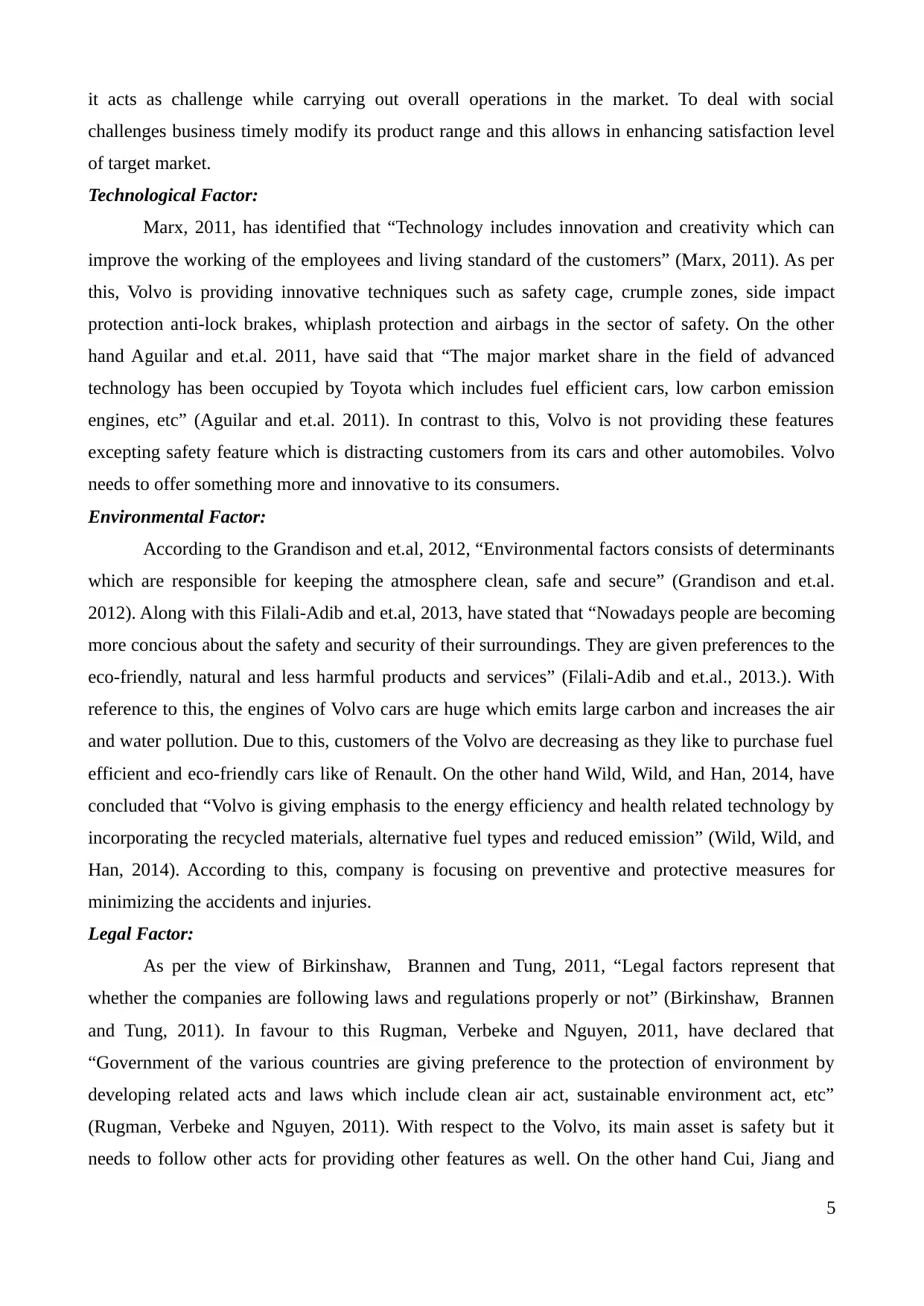
it acts as challenge while carrying out overall operations in the market. To deal with social
challenges business timely modify its product range and this allows in enhancing satisfaction level
of target market.
Technological Factor:
Marx, 2011, has identified that “Technology includes innovation and creativity which can
improve the working of the employees and living standard of the customers” (Marx, 2011). As per
this, Volvo is providing innovative techniques such as safety cage, crumple zones, side impact
protection anti-lock brakes, whiplash protection and airbags in the sector of safety. On the other
hand Aguilar and et.al. 2011, have said that “The major market share in the field of advanced
technology has been occupied by Toyota which includes fuel efficient cars, low carbon emission
engines, etc” (Aguilar and et.al. 2011). In contrast to this, Volvo is not providing these features
excepting safety feature which is distracting customers from its cars and other automobiles. Volvo
needs to offer something more and innovative to its consumers.
Environmental Factor:
According to the Grandison and et.al, 2012, “Environmental factors consists of determinants
which are responsible for keeping the atmosphere clean, safe and secure” (Grandison and et.al.
2012). Along with this Filali-Adib and et.al, 2013, have stated that “Nowadays people are becoming
more concious about the safety and security of their surroundings. They are given preferences to the
eco-friendly, natural and less harmful products and services” (Filali-Adib and et.al., 2013.). With
reference to this, the engines of Volvo cars are huge which emits large carbon and increases the air
and water pollution. Due to this, customers of the Volvo are decreasing as they like to purchase fuel
efficient and eco-friendly cars like of Renault. On the other hand Wild, Wild, and Han, 2014, have
concluded that “Volvo is giving emphasis to the energy efficiency and health related technology by
incorporating the recycled materials, alternative fuel types and reduced emission” (Wild, Wild, and
Han, 2014). According to this, company is focusing on preventive and protective measures for
minimizing the accidents and injuries.
Legal Factor:
As per the view of Birkinshaw, Brannen and Tung, 2011, “Legal factors represent that
whether the companies are following laws and regulations properly or not” (Birkinshaw, Brannen
and Tung, 2011). In favour to this Rugman, Verbeke and Nguyen, 2011, have declared that
“Government of the various countries are giving preference to the protection of environment by
developing related acts and laws which include clean air act, sustainable environment act, etc”
(Rugman, Verbeke and Nguyen, 2011). With respect to the Volvo, its main asset is safety but it
needs to follow other acts for providing other features as well. On the other hand Cui, Jiang and
5
challenges business timely modify its product range and this allows in enhancing satisfaction level
of target market.
Technological Factor:
Marx, 2011, has identified that “Technology includes innovation and creativity which can
improve the working of the employees and living standard of the customers” (Marx, 2011). As per
this, Volvo is providing innovative techniques such as safety cage, crumple zones, side impact
protection anti-lock brakes, whiplash protection and airbags in the sector of safety. On the other
hand Aguilar and et.al. 2011, have said that “The major market share in the field of advanced
technology has been occupied by Toyota which includes fuel efficient cars, low carbon emission
engines, etc” (Aguilar and et.al. 2011). In contrast to this, Volvo is not providing these features
excepting safety feature which is distracting customers from its cars and other automobiles. Volvo
needs to offer something more and innovative to its consumers.
Environmental Factor:
According to the Grandison and et.al, 2012, “Environmental factors consists of determinants
which are responsible for keeping the atmosphere clean, safe and secure” (Grandison and et.al.
2012). Along with this Filali-Adib and et.al, 2013, have stated that “Nowadays people are becoming
more concious about the safety and security of their surroundings. They are given preferences to the
eco-friendly, natural and less harmful products and services” (Filali-Adib and et.al., 2013.). With
reference to this, the engines of Volvo cars are huge which emits large carbon and increases the air
and water pollution. Due to this, customers of the Volvo are decreasing as they like to purchase fuel
efficient and eco-friendly cars like of Renault. On the other hand Wild, Wild, and Han, 2014, have
concluded that “Volvo is giving emphasis to the energy efficiency and health related technology by
incorporating the recycled materials, alternative fuel types and reduced emission” (Wild, Wild, and
Han, 2014). According to this, company is focusing on preventive and protective measures for
minimizing the accidents and injuries.
Legal Factor:
As per the view of Birkinshaw, Brannen and Tung, 2011, “Legal factors represent that
whether the companies are following laws and regulations properly or not” (Birkinshaw, Brannen
and Tung, 2011). In favour to this Rugman, Verbeke and Nguyen, 2011, have declared that
“Government of the various countries are giving preference to the protection of environment by
developing related acts and laws which include clean air act, sustainable environment act, etc”
(Rugman, Verbeke and Nguyen, 2011). With respect to the Volvo, its main asset is safety but it
needs to follow other acts for providing other features as well. On the other hand Cui, Jiang and
5
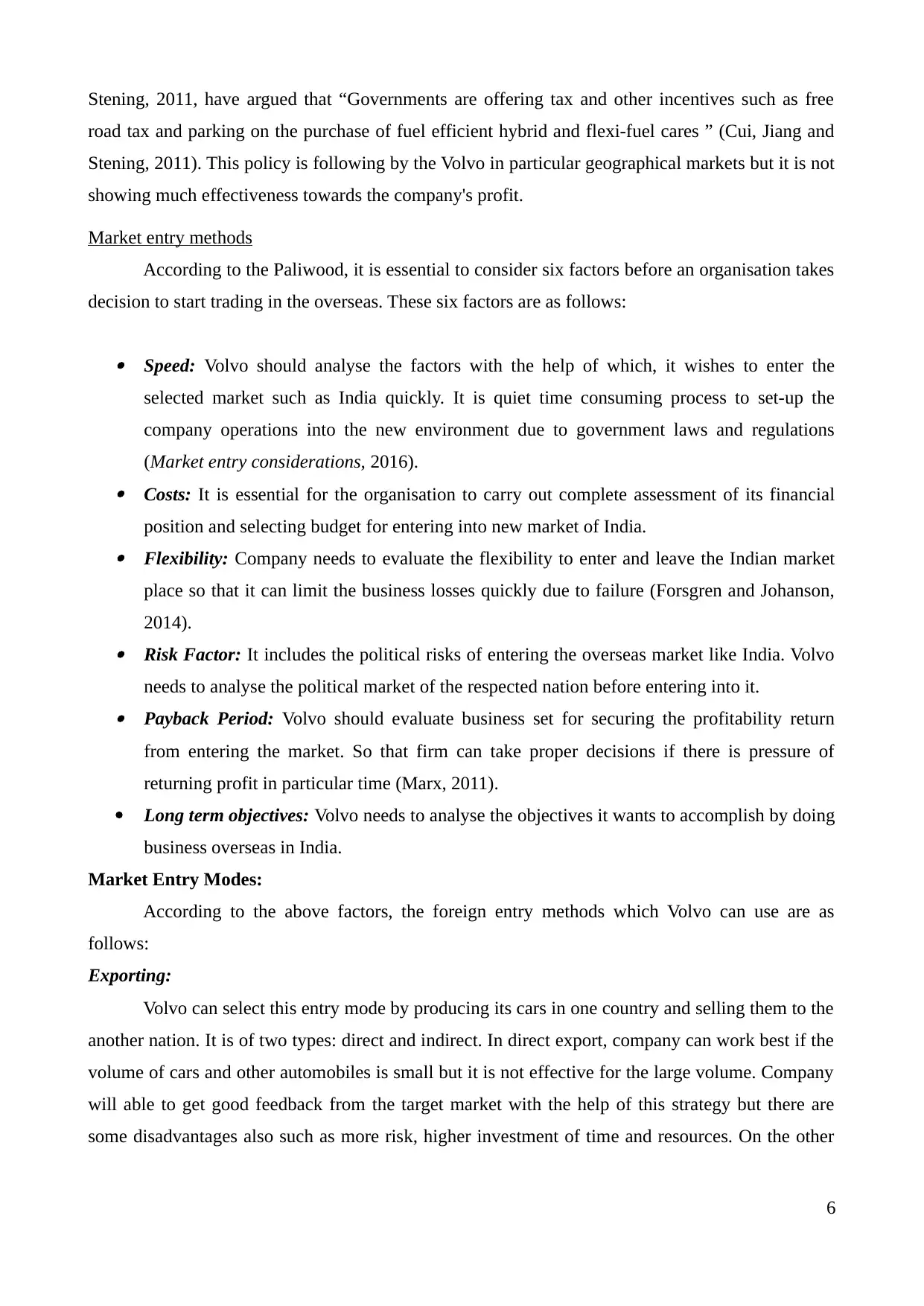
Stening, 2011, have argued that “Governments are offering tax and other incentives such as free
road tax and parking on the purchase of fuel efficient hybrid and flexi-fuel cares ” (Cui, Jiang and
Stening, 2011). This policy is following by the Volvo in particular geographical markets but it is not
showing much effectiveness towards the company's profit.
Market entry methods
According to the Paliwood, it is essential to consider six factors before an organisation takes
decision to start trading in the overseas. These six factors are as follows:
Speed: Volvo should analyse the factors with the help of which, it wishes to enter the
selected market such as India quickly. It is quiet time consuming process to set-up the
company operations into the new environment due to government laws and regulations
(Market entry considerations, 2016). Costs: It is essential for the organisation to carry out complete assessment of its financial
position and selecting budget for entering into new market of India. Flexibility: Company needs to evaluate the flexibility to enter and leave the Indian market
place so that it can limit the business losses quickly due to failure (Forsgren and Johanson,
2014). Risk Factor: It includes the political risks of entering the overseas market like India. Volvo
needs to analyse the political market of the respected nation before entering into it. Payback Period: Volvo should evaluate business set for securing the profitability return
from entering the market. So that firm can take proper decisions if there is pressure of
returning profit in particular time (Marx, 2011).
Long term objectives: Volvo needs to analyse the objectives it wants to accomplish by doing
business overseas in India.
Market Entry Modes:
According to the above factors, the foreign entry methods which Volvo can use are as
follows:
Exporting:
Volvo can select this entry mode by producing its cars in one country and selling them to the
another nation. It is of two types: direct and indirect. In direct export, company can work best if the
volume of cars and other automobiles is small but it is not effective for the large volume. Company
will able to get good feedback from the target market with the help of this strategy but there are
some disadvantages also such as more risk, higher investment of time and resources. On the other
6
road tax and parking on the purchase of fuel efficient hybrid and flexi-fuel cares ” (Cui, Jiang and
Stening, 2011). This policy is following by the Volvo in particular geographical markets but it is not
showing much effectiveness towards the company's profit.
Market entry methods
According to the Paliwood, it is essential to consider six factors before an organisation takes
decision to start trading in the overseas. These six factors are as follows:
Speed: Volvo should analyse the factors with the help of which, it wishes to enter the
selected market such as India quickly. It is quiet time consuming process to set-up the
company operations into the new environment due to government laws and regulations
(Market entry considerations, 2016). Costs: It is essential for the organisation to carry out complete assessment of its financial
position and selecting budget for entering into new market of India. Flexibility: Company needs to evaluate the flexibility to enter and leave the Indian market
place so that it can limit the business losses quickly due to failure (Forsgren and Johanson,
2014). Risk Factor: It includes the political risks of entering the overseas market like India. Volvo
needs to analyse the political market of the respected nation before entering into it. Payback Period: Volvo should evaluate business set for securing the profitability return
from entering the market. So that firm can take proper decisions if there is pressure of
returning profit in particular time (Marx, 2011).
Long term objectives: Volvo needs to analyse the objectives it wants to accomplish by doing
business overseas in India.
Market Entry Modes:
According to the above factors, the foreign entry methods which Volvo can use are as
follows:
Exporting:
Volvo can select this entry mode by producing its cars in one country and selling them to the
another nation. It is of two types: direct and indirect. In direct export, company can work best if the
volume of cars and other automobiles is small but it is not effective for the large volume. Company
will able to get good feedback from the target market with the help of this strategy but there are
some disadvantages also such as more risk, higher investment of time and resources. On the other
6
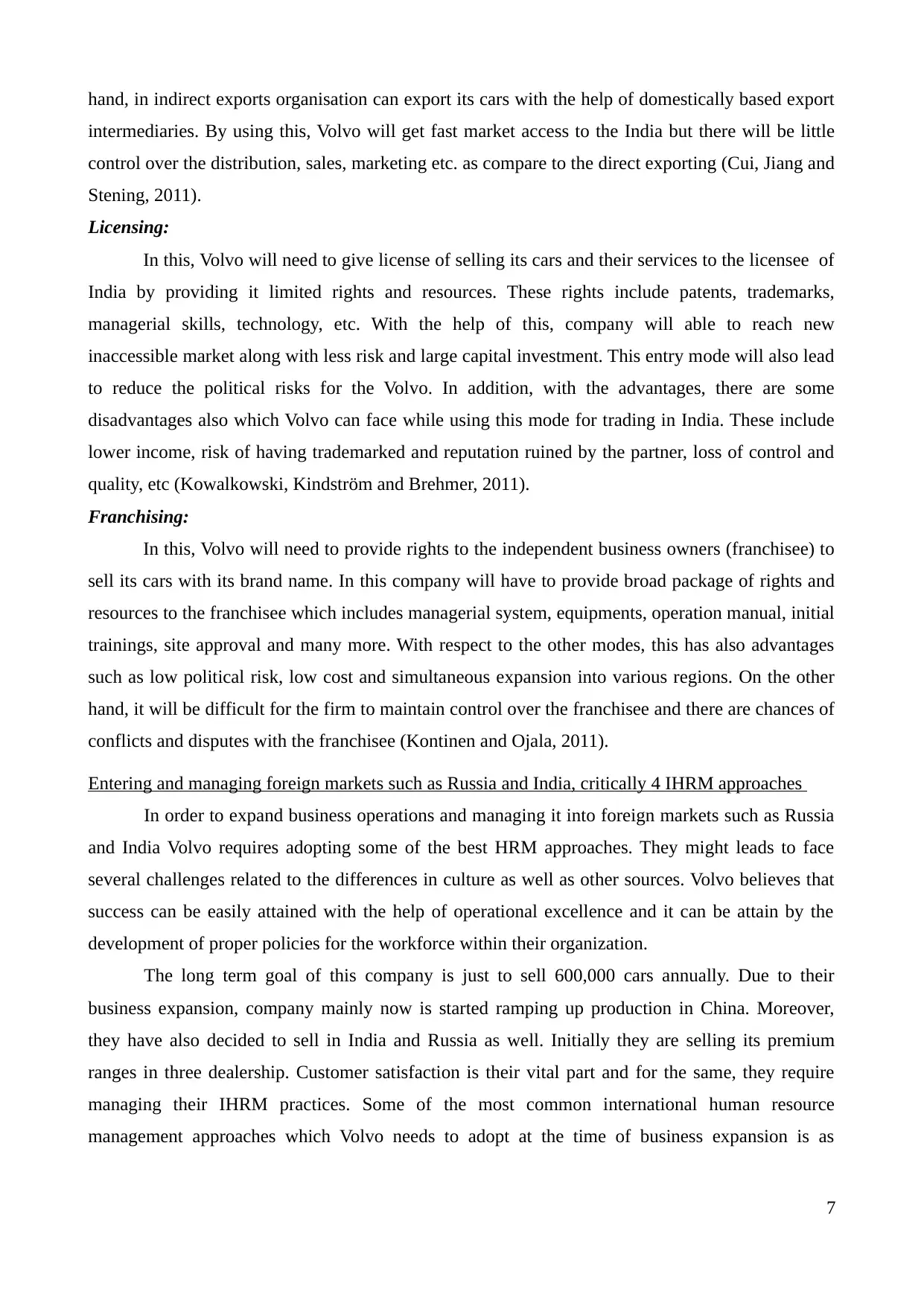
hand, in indirect exports organisation can export its cars with the help of domestically based export
intermediaries. By using this, Volvo will get fast market access to the India but there will be little
control over the distribution, sales, marketing etc. as compare to the direct exporting (Cui, Jiang and
Stening, 2011).
Licensing:
In this, Volvo will need to give license of selling its cars and their services to the licensee of
India by providing it limited rights and resources. These rights include patents, trademarks,
managerial skills, technology, etc. With the help of this, company will able to reach new
inaccessible market along with less risk and large capital investment. This entry mode will also lead
to reduce the political risks for the Volvo. In addition, with the advantages, there are some
disadvantages also which Volvo can face while using this mode for trading in India. These include
lower income, risk of having trademarked and reputation ruined by the partner, loss of control and
quality, etc (Kowalkowski, Kindström and Brehmer, 2011).
Franchising:
In this, Volvo will need to provide rights to the independent business owners (franchisee) to
sell its cars with its brand name. In this company will have to provide broad package of rights and
resources to the franchisee which includes managerial system, equipments, operation manual, initial
trainings, site approval and many more. With respect to the other modes, this has also advantages
such as low political risk, low cost and simultaneous expansion into various regions. On the other
hand, it will be difficult for the firm to maintain control over the franchisee and there are chances of
conflicts and disputes with the franchisee (Kontinen and Ojala, 2011).
Entering and managing foreign markets such as Russia and India, critically 4 IHRM approaches
In order to expand business operations and managing it into foreign markets such as Russia
and India Volvo requires adopting some of the best HRM approaches. They might leads to face
several challenges related to the differences in culture as well as other sources. Volvo believes that
success can be easily attained with the help of operational excellence and it can be attain by the
development of proper policies for the workforce within their organization.
The long term goal of this company is just to sell 600,000 cars annually. Due to their
business expansion, company mainly now is started ramping up production in China. Moreover,
they have also decided to sell in India and Russia as well. Initially they are selling its premium
ranges in three dealership. Customer satisfaction is their vital part and for the same, they require
managing their IHRM practices. Some of the most common international human resource
management approaches which Volvo needs to adopt at the time of business expansion is as
7
intermediaries. By using this, Volvo will get fast market access to the India but there will be little
control over the distribution, sales, marketing etc. as compare to the direct exporting (Cui, Jiang and
Stening, 2011).
Licensing:
In this, Volvo will need to give license of selling its cars and their services to the licensee of
India by providing it limited rights and resources. These rights include patents, trademarks,
managerial skills, technology, etc. With the help of this, company will able to reach new
inaccessible market along with less risk and large capital investment. This entry mode will also lead
to reduce the political risks for the Volvo. In addition, with the advantages, there are some
disadvantages also which Volvo can face while using this mode for trading in India. These include
lower income, risk of having trademarked and reputation ruined by the partner, loss of control and
quality, etc (Kowalkowski, Kindström and Brehmer, 2011).
Franchising:
In this, Volvo will need to provide rights to the independent business owners (franchisee) to
sell its cars with its brand name. In this company will have to provide broad package of rights and
resources to the franchisee which includes managerial system, equipments, operation manual, initial
trainings, site approval and many more. With respect to the other modes, this has also advantages
such as low political risk, low cost and simultaneous expansion into various regions. On the other
hand, it will be difficult for the firm to maintain control over the franchisee and there are chances of
conflicts and disputes with the franchisee (Kontinen and Ojala, 2011).
Entering and managing foreign markets such as Russia and India, critically 4 IHRM approaches
In order to expand business operations and managing it into foreign markets such as Russia
and India Volvo requires adopting some of the best HRM approaches. They might leads to face
several challenges related to the differences in culture as well as other sources. Volvo believes that
success can be easily attained with the help of operational excellence and it can be attain by the
development of proper policies for the workforce within their organization.
The long term goal of this company is just to sell 600,000 cars annually. Due to their
business expansion, company mainly now is started ramping up production in China. Moreover,
they have also decided to sell in India and Russia as well. Initially they are selling its premium
ranges in three dealership. Customer satisfaction is their vital part and for the same, they require
managing their IHRM practices. Some of the most common international human resource
management approaches which Volvo needs to adopt at the time of business expansion is as
7
Paraphrase This Document
Need a fresh take? Get an instant paraphrase of this document with our AI Paraphraser
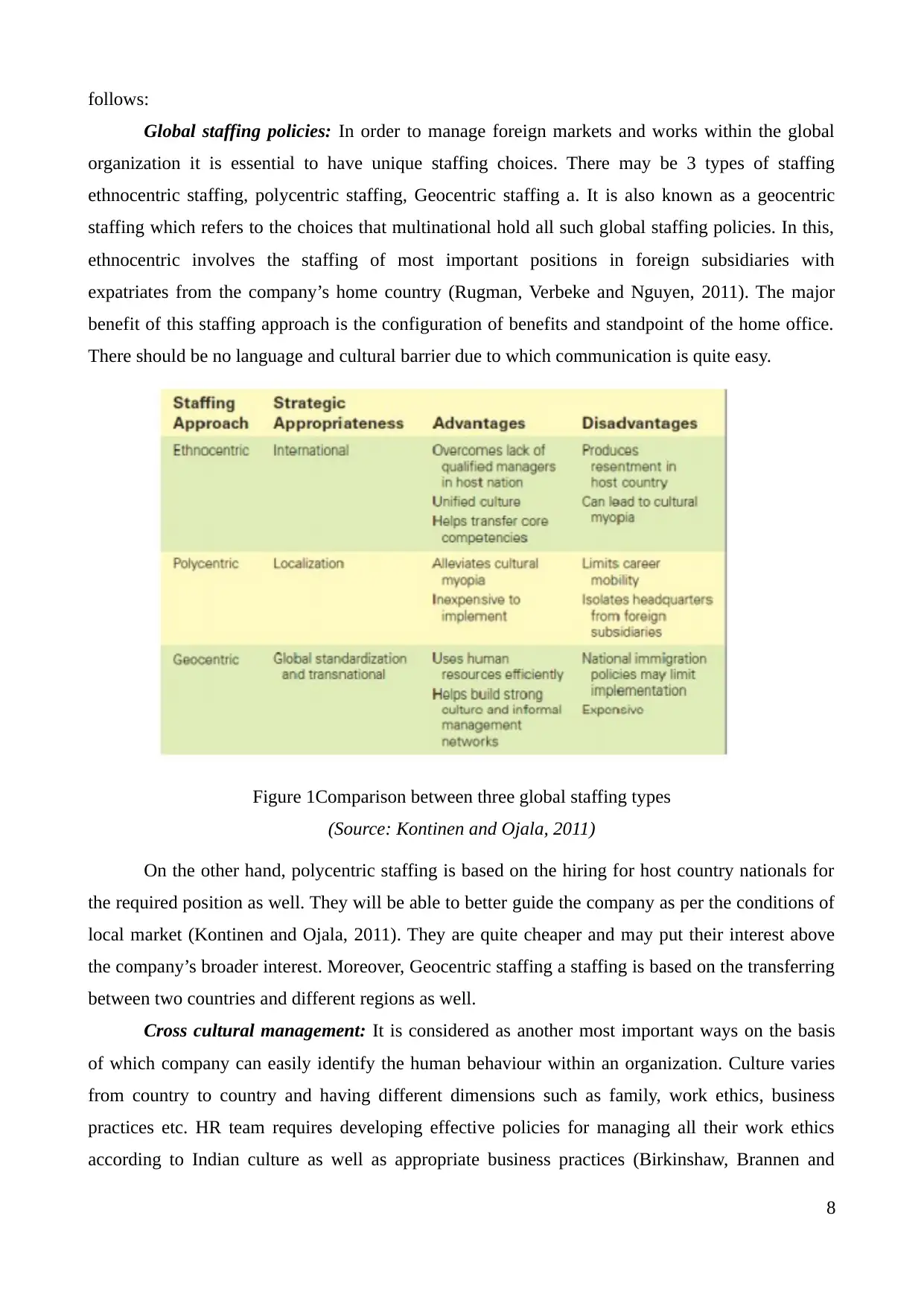
follows:
Global staffing policies: In order to manage foreign markets and works within the global
organization it is essential to have unique staffing choices. There may be 3 types of staffing
ethnocentric staffing, polycentric staffing, Geocentric staffing a. It is also known as a geocentric
staffing which refers to the choices that multinational hold all such global staffing policies. In this,
ethnocentric involves the staffing of most important positions in foreign subsidiaries with
expatriates from the company’s home country (Rugman, Verbeke and Nguyen, 2011). The major
benefit of this staffing approach is the configuration of benefits and standpoint of the home office.
There should be no language and cultural barrier due to which communication is quite easy.
Figure 1Comparison between three global staffing types
(Source: Kontinen and Ojala, 2011)
On the other hand, polycentric staffing is based on the hiring for host country nationals for
the required position as well. They will be able to better guide the company as per the conditions of
local market (Kontinen and Ojala, 2011). They are quite cheaper and may put their interest above
the company’s broader interest. Moreover, Geocentric staffing a staffing is based on the transferring
between two countries and different regions as well.
Cross cultural management: It is considered as another most important ways on the basis
of which company can easily identify the human behaviour within an organization. Culture varies
from country to country and having different dimensions such as family, work ethics, business
practices etc. HR team requires developing effective policies for managing all their work ethics
according to Indian culture as well as appropriate business practices (Birkinshaw, Brannen and
8
Global staffing policies: In order to manage foreign markets and works within the global
organization it is essential to have unique staffing choices. There may be 3 types of staffing
ethnocentric staffing, polycentric staffing, Geocentric staffing a. It is also known as a geocentric
staffing which refers to the choices that multinational hold all such global staffing policies. In this,
ethnocentric involves the staffing of most important positions in foreign subsidiaries with
expatriates from the company’s home country (Rugman, Verbeke and Nguyen, 2011). The major
benefit of this staffing approach is the configuration of benefits and standpoint of the home office.
There should be no language and cultural barrier due to which communication is quite easy.
Figure 1Comparison between three global staffing types
(Source: Kontinen and Ojala, 2011)
On the other hand, polycentric staffing is based on the hiring for host country nationals for
the required position as well. They will be able to better guide the company as per the conditions of
local market (Kontinen and Ojala, 2011). They are quite cheaper and may put their interest above
the company’s broader interest. Moreover, Geocentric staffing a staffing is based on the transferring
between two countries and different regions as well.
Cross cultural management: It is considered as another most important ways on the basis
of which company can easily identify the human behaviour within an organization. Culture varies
from country to country and having different dimensions such as family, work ethics, business
practices etc. HR team requires developing effective policies for managing all their work ethics
according to Indian culture as well as appropriate business practices (Birkinshaw, Brannen and
8
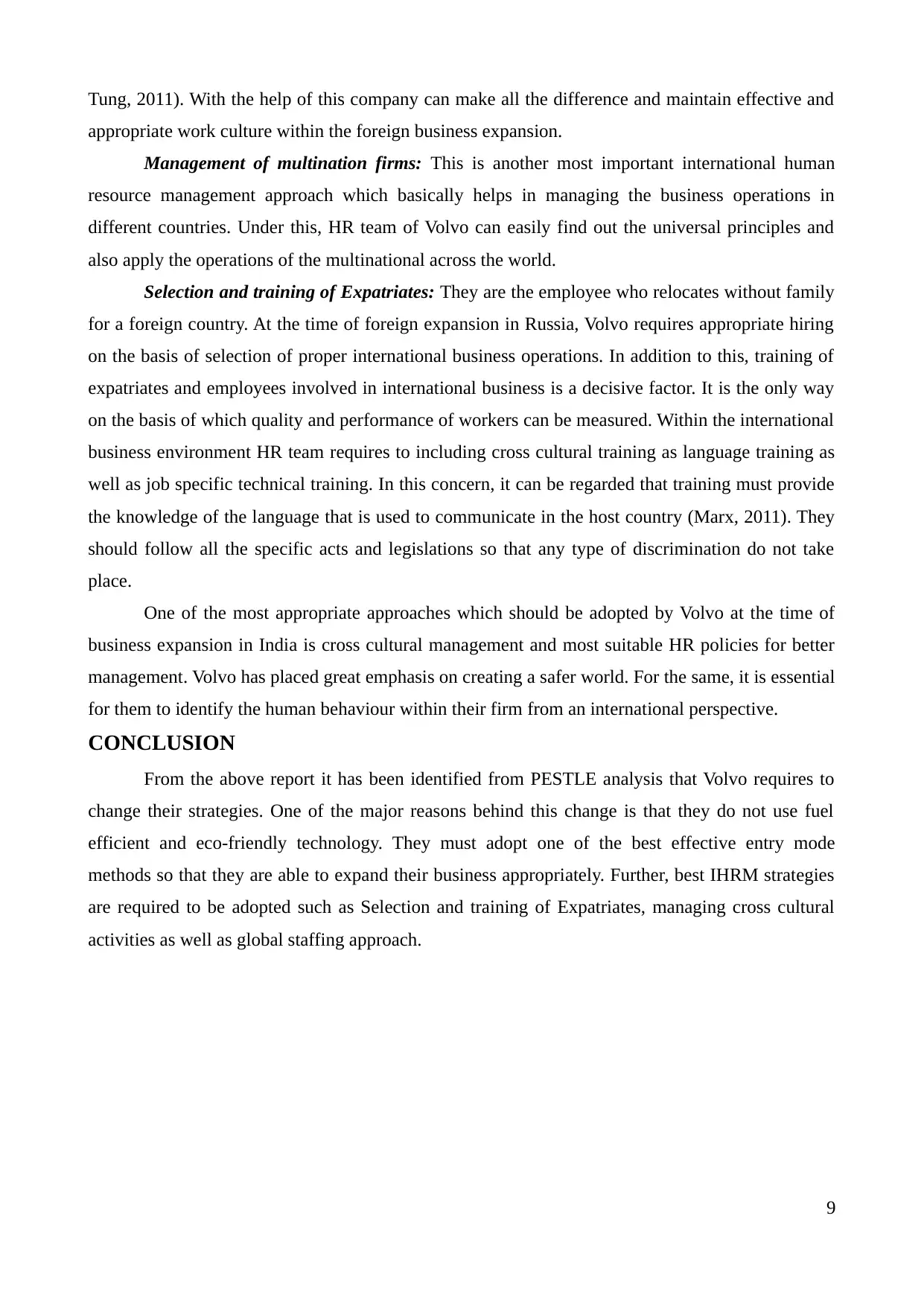
Tung, 2011). With the help of this company can make all the difference and maintain effective and
appropriate work culture within the foreign business expansion.
Management of multination firms: This is another most important international human
resource management approach which basically helps in managing the business operations in
different countries. Under this, HR team of Volvo can easily find out the universal principles and
also apply the operations of the multinational across the world.
Selection and training of Expatriates: They are the employee who relocates without family
for a foreign country. At the time of foreign expansion in Russia, Volvo requires appropriate hiring
on the basis of selection of proper international business operations. In addition to this, training of
expatriates and employees involved in international business is a decisive factor. It is the only way
on the basis of which quality and performance of workers can be measured. Within the international
business environment HR team requires to including cross cultural training as language training as
well as job specific technical training. In this concern, it can be regarded that training must provide
the knowledge of the language that is used to communicate in the host country (Marx, 2011). They
should follow all the specific acts and legislations so that any type of discrimination do not take
place.
One of the most appropriate approaches which should be adopted by Volvo at the time of
business expansion in India is cross cultural management and most suitable HR policies for better
management. Volvo has placed great emphasis on creating a safer world. For the same, it is essential
for them to identify the human behaviour within their firm from an international perspective.
CONCLUSION
From the above report it has been identified from PESTLE analysis that Volvo requires to
change their strategies. One of the major reasons behind this change is that they do not use fuel
efficient and eco-friendly technology. They must adopt one of the best effective entry mode
methods so that they are able to expand their business appropriately. Further, best IHRM strategies
are required to be adopted such as Selection and training of Expatriates, managing cross cultural
activities as well as global staffing approach.
9
appropriate work culture within the foreign business expansion.
Management of multination firms: This is another most important international human
resource management approach which basically helps in managing the business operations in
different countries. Under this, HR team of Volvo can easily find out the universal principles and
also apply the operations of the multinational across the world.
Selection and training of Expatriates: They are the employee who relocates without family
for a foreign country. At the time of foreign expansion in Russia, Volvo requires appropriate hiring
on the basis of selection of proper international business operations. In addition to this, training of
expatriates and employees involved in international business is a decisive factor. It is the only way
on the basis of which quality and performance of workers can be measured. Within the international
business environment HR team requires to including cross cultural training as language training as
well as job specific technical training. In this concern, it can be regarded that training must provide
the knowledge of the language that is used to communicate in the host country (Marx, 2011). They
should follow all the specific acts and legislations so that any type of discrimination do not take
place.
One of the most appropriate approaches which should be adopted by Volvo at the time of
business expansion in India is cross cultural management and most suitable HR policies for better
management. Volvo has placed great emphasis on creating a safer world. For the same, it is essential
for them to identify the human behaviour within their firm from an international perspective.
CONCLUSION
From the above report it has been identified from PESTLE analysis that Volvo requires to
change their strategies. One of the major reasons behind this change is that they do not use fuel
efficient and eco-friendly technology. They must adopt one of the best effective entry mode
methods so that they are able to expand their business appropriately. Further, best IHRM strategies
are required to be adopted such as Selection and training of Expatriates, managing cross cultural
activities as well as global staffing approach.
9
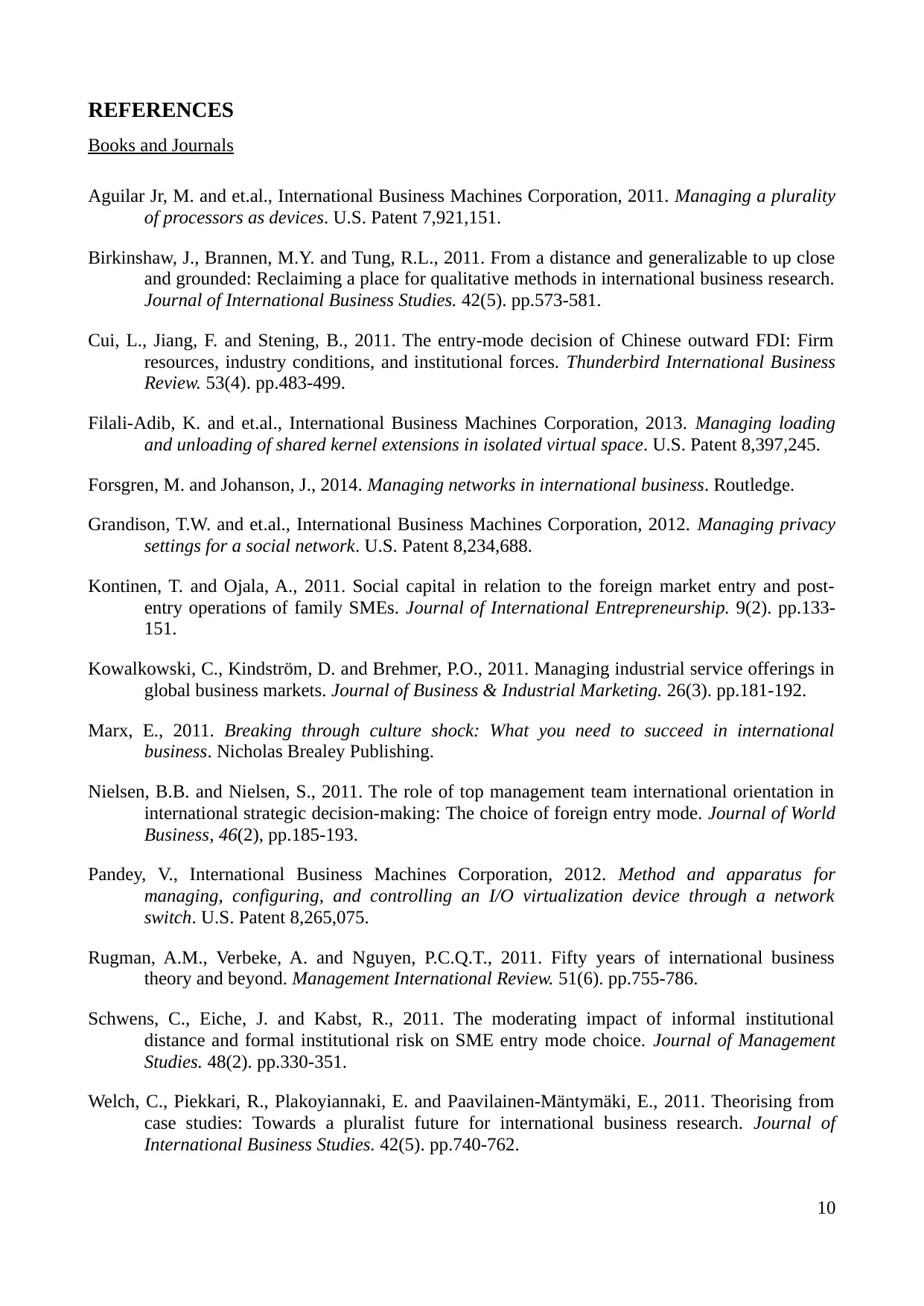
REFERENCES
Books and Journals
Aguilar Jr, M. and et.al., International Business Machines Corporation, 2011. Managing a plurality
of processors as devices. U.S. Patent 7,921,151.
Birkinshaw, J., Brannen, M.Y. and Tung, R.L., 2011. From a distance and generalizable to up close
and grounded: Reclaiming a place for qualitative methods in international business research.
Journal of International Business Studies. 42(5). pp.573-581.
Cui, L., Jiang, F. and Stening, B., 2011. The entry‐mode decision of Chinese outward FDI: Firm
resources, industry conditions, and institutional forces. Thunderbird International Business
Review. 53(4). pp.483-499.
Filali-Adib, K. and et.al., International Business Machines Corporation, 2013. Managing loading
and unloading of shared kernel extensions in isolated virtual space. U.S. Patent 8,397,245.
Forsgren, M. and Johanson, J., 2014. Managing networks in international business. Routledge.
Grandison, T.W. and et.al., International Business Machines Corporation, 2012. Managing privacy
settings for a social network. U.S. Patent 8,234,688.
Kontinen, T. and Ojala, A., 2011. Social capital in relation to the foreign market entry and post-
entry operations of family SMEs. Journal of International Entrepreneurship. 9(2). pp.133-
151.
Kowalkowski, C., Kindström, D. and Brehmer, P.O., 2011. Managing industrial service offerings in
global business markets. Journal of Business & Industrial Marketing. 26(3). pp.181-192.
Marx, E., 2011. Breaking through culture shock: What you need to succeed in international
business. Nicholas Brealey Publishing.
Nielsen, B.B. and Nielsen, S., 2011. The role of top management team international orientation in
international strategic decision-making: The choice of foreign entry mode. Journal of World
Business, 46(2), pp.185-193.
Pandey, V., International Business Machines Corporation, 2012. Method and apparatus for
managing, configuring, and controlling an I/O virtualization device through a network
switch. U.S. Patent 8,265,075.
Rugman, A.M., Verbeke, A. and Nguyen, P.C.Q.T., 2011. Fifty years of international business
theory and beyond. Management International Review. 51(6). pp.755-786.
Schwens, C., Eiche, J. and Kabst, R., 2011. The moderating impact of informal institutional
distance and formal institutional risk on SME entry mode choice. Journal of Management
Studies. 48(2). pp.330-351.
Welch, C., Piekkari, R., Plakoyiannaki, E. and Paavilainen-Mäntymäki, E., 2011. Theorising from
case studies: Towards a pluralist future for international business research. Journal of
International Business Studies. 42(5). pp.740-762.
10
Books and Journals
Aguilar Jr, M. and et.al., International Business Machines Corporation, 2011. Managing a plurality
of processors as devices. U.S. Patent 7,921,151.
Birkinshaw, J., Brannen, M.Y. and Tung, R.L., 2011. From a distance and generalizable to up close
and grounded: Reclaiming a place for qualitative methods in international business research.
Journal of International Business Studies. 42(5). pp.573-581.
Cui, L., Jiang, F. and Stening, B., 2011. The entry‐mode decision of Chinese outward FDI: Firm
resources, industry conditions, and institutional forces. Thunderbird International Business
Review. 53(4). pp.483-499.
Filali-Adib, K. and et.al., International Business Machines Corporation, 2013. Managing loading
and unloading of shared kernel extensions in isolated virtual space. U.S. Patent 8,397,245.
Forsgren, M. and Johanson, J., 2014. Managing networks in international business. Routledge.
Grandison, T.W. and et.al., International Business Machines Corporation, 2012. Managing privacy
settings for a social network. U.S. Patent 8,234,688.
Kontinen, T. and Ojala, A., 2011. Social capital in relation to the foreign market entry and post-
entry operations of family SMEs. Journal of International Entrepreneurship. 9(2). pp.133-
151.
Kowalkowski, C., Kindström, D. and Brehmer, P.O., 2011. Managing industrial service offerings in
global business markets. Journal of Business & Industrial Marketing. 26(3). pp.181-192.
Marx, E., 2011. Breaking through culture shock: What you need to succeed in international
business. Nicholas Brealey Publishing.
Nielsen, B.B. and Nielsen, S., 2011. The role of top management team international orientation in
international strategic decision-making: The choice of foreign entry mode. Journal of World
Business, 46(2), pp.185-193.
Pandey, V., International Business Machines Corporation, 2012. Method and apparatus for
managing, configuring, and controlling an I/O virtualization device through a network
switch. U.S. Patent 8,265,075.
Rugman, A.M., Verbeke, A. and Nguyen, P.C.Q.T., 2011. Fifty years of international business
theory and beyond. Management International Review. 51(6). pp.755-786.
Schwens, C., Eiche, J. and Kabst, R., 2011. The moderating impact of informal institutional
distance and formal institutional risk on SME entry mode choice. Journal of Management
Studies. 48(2). pp.330-351.
Welch, C., Piekkari, R., Plakoyiannaki, E. and Paavilainen-Mäntymäki, E., 2011. Theorising from
case studies: Towards a pluralist future for international business research. Journal of
International Business Studies. 42(5). pp.740-762.
10
Secure Best Marks with AI Grader
Need help grading? Try our AI Grader for instant feedback on your assignments.
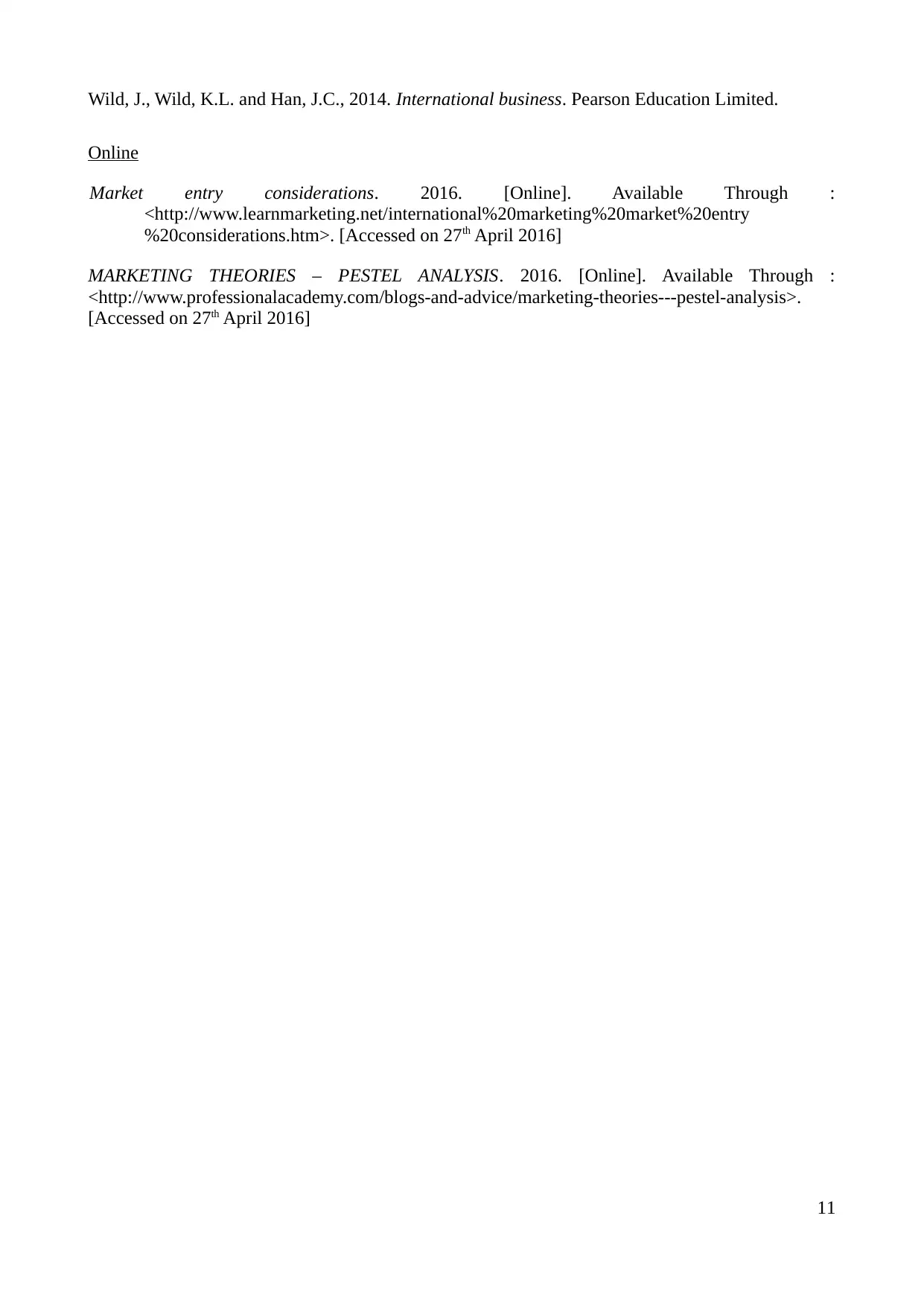
Wild, J., Wild, K.L. and Han, J.C., 2014. International business. Pearson Education Limited.
Online
Market entry considerations. 2016. [Online]. Available Through :
<http://www.learnmarketing.net/international%20marketing%20market%20entry
%20considerations.htm>. [Accessed on 27th April 2016]
MARKETING THEORIES – PESTEL ANALYSIS. 2016. [Online]. Available Through :
<http://www.professionalacademy.com/blogs-and-advice/marketing-theories---pestel-analysis>.
[Accessed on 27th April 2016]
11
Online
Market entry considerations. 2016. [Online]. Available Through :
<http://www.learnmarketing.net/international%20marketing%20market%20entry
%20considerations.htm>. [Accessed on 27th April 2016]
MARKETING THEORIES – PESTEL ANALYSIS. 2016. [Online]. Available Through :
<http://www.professionalacademy.com/blogs-and-advice/marketing-theories---pestel-analysis>.
[Accessed on 27th April 2016]
11
1 out of 11
Related Documents
Your All-in-One AI-Powered Toolkit for Academic Success.
+13062052269
info@desklib.com
Available 24*7 on WhatsApp / Email
![[object Object]](/_next/static/media/star-bottom.7253800d.svg)
Unlock your academic potential
© 2024 | Zucol Services PVT LTD | All rights reserved.




